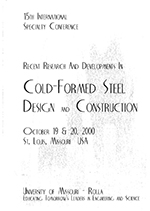Session Dates
19 Oct 2000
Abstract
The overall behavior under bending moment of cold-formed steel C-sections assemblies was investigated. Each test assembly consisted of C-sections acting as beams having a track to restrain the ends. Lateral bracing to restrain C-sections from rotation was provided at mid-span. To better understand the influence of the brace connection on the bending behavior, an experimental investigation was carried out with particular emphasis placed on the study of the effect of the mid-span brace connection on the bending behavior, and the effect of attaching dry wall to the tension flange. For the dry wall test specimens, lateral bracing was also provided at mid-span. The tested moment capacities are compared to predictions based on the 1996 American Iron and Steel Institutes' Specification for Design of Cold-formed Steel Structural Members.
Department(s)
Civil, Architectural and Environmental Engineering
Research Center/Lab(s)
Wei-Wen Yu Center for Cold-Formed Steel Structures
Meeting Name
15th International Specialty Conference on Cold-Formed Steel Structures
Publisher
University of Missouri--Rolla
Document Version
Final Version
Rights
© 2000 University of Missouri--Rolla, All rights reserved.
Document Type
Article - Conference proceedings
File Type
text
Language
English
Recommended Citation
Beshara, B. and LaBoube, Roger A., "Lateral Bracing Connections for C-sections Subjected to Bending" (2000). CCFSS Proceedings of International Specialty Conference on Cold-Formed Steel Structures (1971 - 2018). 3.
https://scholarsmine.mst.edu/isccss/15iccfss/15iccfss-session3/3
Lateral Bracing Connections for C-sections Subjected to Bending
The overall behavior under bending moment of cold-formed steel C-sections assemblies was investigated. Each test assembly consisted of C-sections acting as beams having a track to restrain the ends. Lateral bracing to restrain C-sections from rotation was provided at mid-span. To better understand the influence of the brace connection on the bending behavior, an experimental investigation was carried out with particular emphasis placed on the study of the effect of the mid-span brace connection on the bending behavior, and the effect of attaching dry wall to the tension flange. For the dry wall test specimens, lateral bracing was also provided at mid-span. The tested moment capacities are compared to predictions based on the 1996 American Iron and Steel Institutes' Specification for Design of Cold-formed Steel Structural Members.



